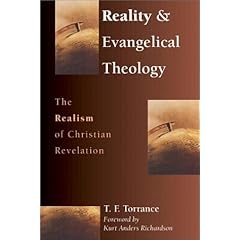 I'm beginning to go through T F Torrance's Reality and Evangelical Theology and love it already having only read the preface. There he makes, as this post's title indicates, a scathing critique of both theological liberalism and fundamentalism for plunging the church into confusion about matters it wrestled with unto understanding long ago. He starts with this claim: "The ultimate fact with which we have to come to terms in all theological and biblical interpretation... is that while God is who he is in his self-revelation, that divine revelation is God himself, for it is not just something of himself that God reveals to us but his very own Self, his own ultimate Being as God" (14).
I'm beginning to go through T F Torrance's Reality and Evangelical Theology and love it already having only read the preface. There he makes, as this post's title indicates, a scathing critique of both theological liberalism and fundamentalism for plunging the church into confusion about matters it wrestled with unto understanding long ago. He starts with this claim: "The ultimate fact with which we have to come to terms in all theological and biblical interpretation... is that while God is who he is in his self-revelation, that divine revelation is God himself, for it is not just something of himself that God reveals to us but his very own Self, his own ultimate Being as God" (14). He then traces how the Church has had to contend for this truth in history at two points (attributing this insight to Karl Barth). First, in the 4th century Arian controversy, the church, in the face of subordinationist heresy, was driven by rigorous study and contemplation of Scripture to clarify that "what God is toward us in Jesus Christ and in the Holy Spirit he is in himself in his own eternal Being as God" (14). Thus his Act toward us not only reveals but actually is his Being. Second, in the 16th century Reformation, the church, in the face of rank ecclesial abuse justified by a perverted judicial logic, was driven to clarify that "grace is to be understood as the impartation not just of something from God but of God himself" (14). Thus it is God's eternal, loving, healing, person-making Being that constitutes his Act toward us, Himself the content of the Gift he gives to us.
Liberalism and fundamentalism together have brought the 4th and 16th centuries back into the 20th and 21st centuries. Liberalism plays the part of Arianism, "stumbling", in Torrance's words, over the identity between the historical man Jesus Christ and the eternal triune God so that Jesus is seen merely as man, an expression of the religious spirit of humanity. Fundamentalism, less obviously perhaps but thus more interestingly, plays the part of medieval Roman Catholicism, stumbling before the continuous Self-giving and Self-revealing of God the Father through the ministry of His Son by the power of the Holy Spirit. Instead, fundamentalism substitutes a static notion of revelation as localized and fixed forever in the closed canon of Scripture for the more biblical notion of God's continuous active revelation by the living Word and Spirit through Scripture and the church's ongoing proclamation, worship, and service.
Thus while medieval Roman Catholicism understood God's gift as merit, rather than as God's meritorious Self, which was then localized in the hierarchy and sacraments of the church where we all need to go to get it, fundamentalism understands God's gift as truths, rather than God's Self who is the Truth, which are then localized in the Bible where we all need to go to get them. It must be understood that neither of these critiques, against Romanism or fundamentalism, are meant to deny the integral place of the church or the Bible within God's economy of salvation, but neither the church nor the Bible ought ever to be confused with God Himself. These are God's chosen vessels through which his Word is proclaimed, but both medieval Roman Catholicism and modern fundamentalism fail to acknowledge that God mediates Himself in a direct way through their proclamation.
Bingo.
ReplyDeleteFantastic post, and I'll have to add this book to my Torrance stack! Thanks for the head's up.
So if this is the intro, what is the book about? What is he doing with "reality" and "realism?"
Yeah,
ReplyDeleteI liked this post too; indeed one more TFT book to read (of his 600 publications) ;-).
Thanks guys.
ReplyDeleteDarren, from what I can gather so far, Torrance is advocating what he calls "evangelical realism" which is grounded in the objectivity of God's Being and Act in Jesus Christ which then stands in a position of absolute authority over all statements about Him, including biblical statements, all of which necessarily fall short of the infinite, transcendent, inexpressible Being of God revealed in Christ. So its realism because it acknowledges the objective actualitiy of God concretely revealed in our world, but it is a sort of critical realism because it acknowledges the relative validity of theological statements, seeing them as never true in themselves, but pointing to a truth finally beyond their ability to comprehensively express.